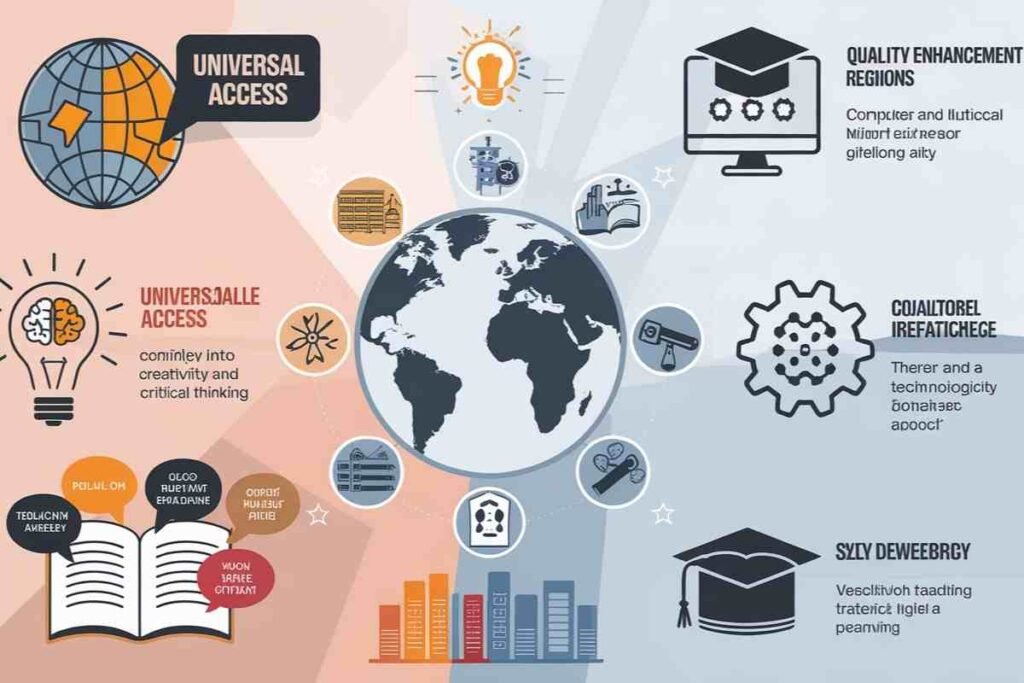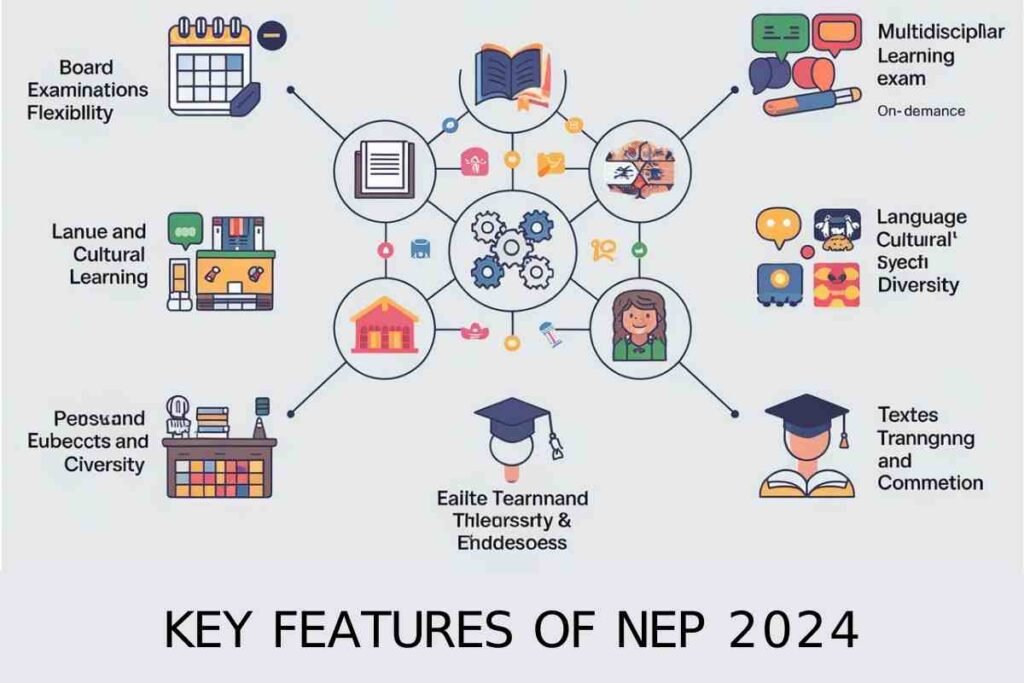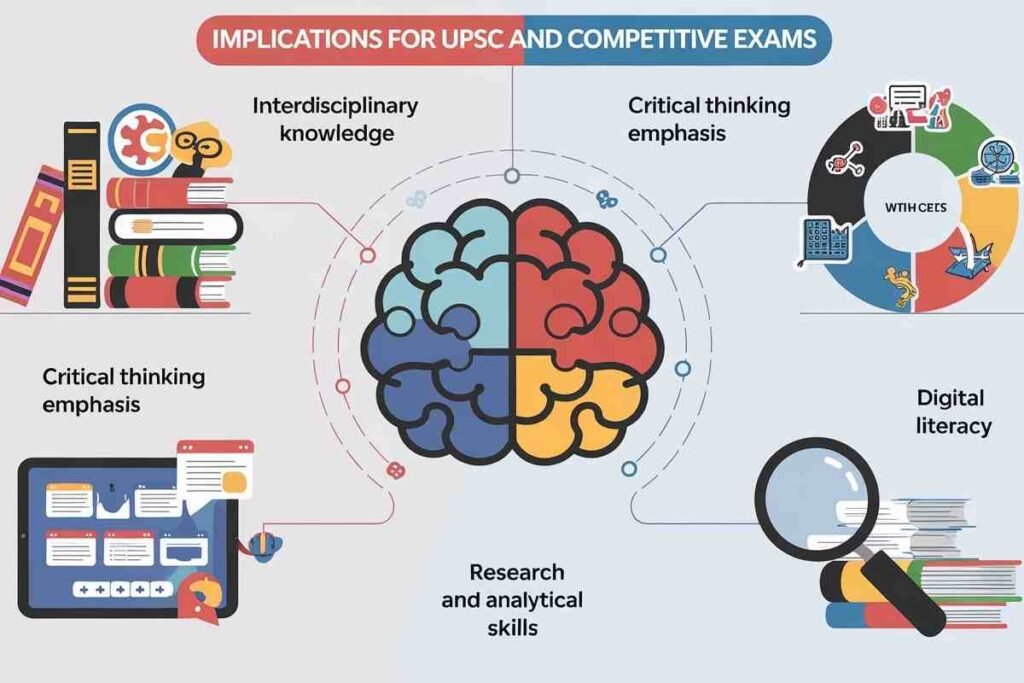The New Education Policy 2024 introduces comprehensive reforms to modernize India’s education system, from pre primary to higher education.
Building on NEP 2020, it emphasizes holistic and flexible learning, critical thinking, and global competitiveness, with a vision to establish India as a knowledge superpower.
This guide covers its key features, objectives, and impact on students, including UPSC and college readiness.
Objectives of NEP 2024

The NEP 2024 focuses on several strategic goals:
- Universal Access: Ensuring equitable access to quality education across all regions.
- Quality Enhancement: Promoting critical thinking, creativity, and lifelong learning.
- Global Competitiveness: Preparing students for a rapidly evolving, digital job market.
- Cultural Integration: Encouraging the use of regional languages and preserving India’s cultural diversity.
- Skill Development: Providing vocational training from an early age to prepare students for diverse career paths.
Implementation Date and Structure
The New Education Policy 2024 has already been approved, with gradual implementation expected across 2024-2025. This phased approach ensures that institutions at all levels can adapt to the new structure, ultimately supporting its success.
Table: NEP 2024 Implementation Timeline
| Milestone | Expected Timeline |
|---|---|
| Approval of Policy | Early 2024 |
| Initial Implementation in Schools | Late 2024 |
| Phased Rollout in Colleges | Early 2025 |
| Full Policy Integration | 2025 |
Stages of School Education: The 5+3+3+4 Model
The 5+3+3+4 model is a cornerstone of NEP 2024, replacing the traditional 10+2 structure with a more developmentally aligned framework.
- Foundational Stage (Ages 3-8, Grades Pre-primary to 2): Focuses on play-based learning.
- Preparatory Stage (Ages 8-11, Grades 3 to 5): Emphasizes literacy, numeracy, and basic knowledge.
- Middle Stage (Ages 11-14, Grades 6 to 8): Introduces a subject-based curriculum.
- Secondary Stage (Ages 14-18, Grades 9 to 12): Offers flexibility in subject choice, eliminating rigid streams.
This structure allows a gradual shift from play-based learning to academic rigor, meeting children’s developmental needs at each stage.
Key Features of NEP 2024

The New Education Policy 2024 encompasses multiple reforms designed to modernize India’s education system.
Board Examinations: Flexibility and Reduced Pressure
NEP 2024 introduces flexible, “on-demand” board examinations, allowing students to attempt exams twice a year and retain their best scores. This approach reduces stress and promotes mastery over rote memorization.
Multidisciplinary and Experiential Learning
The policy encourages multidisciplinary learning, enabling students to choose subjects across streams like Arts, Science, and Commerce. This flexibility fosters critical thinking and problem-solving skills. For example, a student may combine Physics and Music, tailoring their education to their interests and strengths.
Language and Cultural Diversity
Under NEP 2024, students must study at least two languages, with one being an Indian language. This enhances cultural awareness and preserves India’s rich linguistic heritage, essential for a more inclusive education system.
Early Childhood Education
Extending free and compulsory education from age 3 to 18, NEP 2024 emphasizes early childhood education. Recognizing that 85% of brain development occurs before age 6, the policy supports pre-primary education to lay a strong foundation for lifelong learning.
Vocational Education and Skill Development
Vocational training starts early in the school years, empowering students with job-relevant skills for self-employment or entrepreneurship. The policy aims for at least half of students to receive vocational training by 2025.
Teacher Training and Professional Development
Acknowledging teachers as pivotal to student success, NEP 2024 mandates continuous professional development. Teachers will receive regular training to refine their skills and stay current with educational best practices.
Technological Integration
Technology is central to the NEP 2024 vision, bridging the urban-rural divide in education. Schools will incorporate digital classrooms and online resources, ensuring equitable access to quality education, regardless of geographic location.
NEP 2024 for College Students and Graduates
NEP 2024 introduces flexibility in higher education, reshaping the path for students pursuing graduation and other advanced studies:
- Multiple Exit Options: Students can exit college after completing one, two, or three years with a certificate, diploma, or degree, respectively.
- Multidisciplinary Approach: Higher education institutions will offer a wider array of subjects, promoting interdisciplinary knowledge.
- Increased Research Opportunities: Research in areas like STEM, humanities, and vocational studies will be prioritized to foster innovation.
- Industry-Integrated Curriculum: Collaborating with industry leaders, colleges will provide internships and practical experiences that bridge the skills gap.
Implications for UPSC and Competitive Exams

The New Education Policy 2024 UPSC implications are notable for students aiming for government and public sector careers. The policy’s focus on critical thinking, flexibility, and comprehensive understanding aligns well with the skills needed for competitive exams. UPSC aspirants can benefit from:
- Interdisciplinary Knowledge: The ability to choose subjects across streams helps in building diverse knowledge applicable in exams.
- Focus on Critical Thinking: Preparing students for UPSC by encouraging analytical thinking over rote memorization.
- Digital Literacy: With an increased emphasis on technology, students gain digital skills, essential in today’s competitive exam environment.
Table: Key NEP 2024 Implications for UPSC Aspirants
| NEP Feature | Impact on UPSC Preparation |
|---|---|
| Interdisciplinary Learning | Broadens knowledge across subjects |
| Critical Thinking Emphasis | Enhances analytical skills needed for exams |
| Flexible Curriculum | Allows focus on key subjects for civil services |
| Digital Literacy | Prepares students for technology-driven exams |
Conclusion
The New Education Policy 2024 is a forward-thinking approach that aims to overhaul the Indian education system, making it more inclusive, flexible, and future-ready. From foundational education to graduation and beyond, NEP 2024 is set to equip students with the skills, knowledge, and resilience required in a rapidly evolving global landscape.
With its emphasis on critical thinking, cultural diversity, and digital literacy, the policy is an essential step in transforming India’s youth into global citizens and positioning India as a global knowledge hub.
FAQS
What is the New Education Policy 2024?
The New Education Policy 2024 is a comprehensive reform of India’s education system, aiming to make learning more holistic, flexible, and skill-oriented from pre-primary to higher education.
How is the 5+3+3+4 structure different from the old 10+2 system?
The new 5+3+3+4 structure reorganizes schooling into four stages based on age: foundational, preparatory, middle, and secondary, focusing on age-appropriate skill-building and holistic development.
When will the New Education Policy 2024 be implemented?
The implementation of NEP 2024 is expected to begin soon after its approval by the Union Cabinet, with a phased rollout over several years.
How will NEP 2024 affect board exams?
NEP 2024 allows students to take board exams twice a year, offering them the flexibility to retain their best scores and reducing the pressure of one-time assessments.
What changes does NEP 2024 bring for college students?
For college students, NEP 2024 introduces flexibility in course choices, interdisciplinary study options, and a focus on practical skills, including vocational training and internships.
Will NEP 2024 help with UPSC preparation?
Yes, NEP 2024 emphasizes critical thinking, analytical skills, and multidisciplinary learning, which align well with the skills needed for UPSC and other competitive exams.
Is vocational training included in NEP 2024?
Yes, NEP 2024 promotes vocational education from early stages, integrating skill development into the curriculum to prepare students for future job markets.
How does NEP 2024 promote language diversity?
NEP 2024 requires students to learn at least one Indian language and supports multilingual education to preserve cultural heritage and improve linguistic skills.